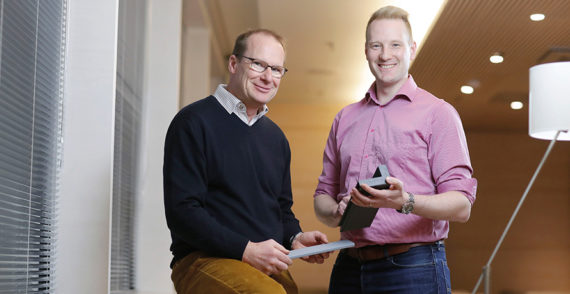“UPM ProFi has been at the forefront of the Biofore strategy from the very beginning by creating new products from the side streams of industrial production. UPM ProFi is also the first biocomposite material that UPM introduced to the market,” explains Edward Robinson, Director of Design, Development and Marketing at UPM Biocomposites.
As part of its Biofore strategy, UPM has been striving to expand its traditional forest industry product portfolio into new fields since the mid-2000s. One of its very first innovations was UPM ProFi, a biocomposite made out of surplus material from UPM Raflatac label stock production.
Robinson attests that recycled label material is a perfect match for fabricating composite products. “Label material contains plastics and paper. Lignin-free cellulose fibre found in release paper has better colour durability when used in UPM ProFi products than the wood fibres found in traditional wood-plastic composite products.”

Edward Robinson and Juha Nikkola
UPM started UPM ProFi production at the Lahti site in 2007. Nowadays, most of its production is located in Bruchsal, Germany. The factory incorporates side streams from UPM Raflatac and its clients. Between 2007 and 2016, UPM ProFi reused approximately 38,000 tonnes of surplus label material. This means that a volume equal to 1,600 lorry loads of waste has been recycled into UPM ProFi Deck raw material instead of ending up as landfill or being incinerated. Robinson adds that the circular philosophy is also at the core of UPM ProFi’s industrial processes. “For example, we recycle water used in cooling and are able to reuse all scrap material produced in the factory. The circular approach underpins all of our operations.”
Design matters
UPM ProFi represents eco-design at its purest, minimising landfill waste and prolonging the life cycle of natural resources. UPM ProFi can also be recycled back into raw material or burned to generate energy. Robinson notes that the circular philosophy goes hand in hand with an emphasis on designing high-quality material. People won’t buy a material simply because it is recycled or environmentally sound —it also needs to fulfil other quality criteria.
“Our products are highly visible to customers. If there is decking installed at your home, you touch, see and feel it every day. We therefore have to think about the look and feel of the material. Decks have to be safe to use and must offer a good frictional surface to prevent slips and falls.”
Outdoor decks are sometimes exposed to extreme weather and climate conditions. “The colour and other product qualities must be able to withstand weather at extremes of hot and cold. Conditions vary from -30 degrees Celsius in Lapland to + 70-80 degrees in Abu Dhabi, where outdoor decks are directly exposed to the burning sun.”
Still looking fresh
“To celebrate the 10th anniversary, we launched our ‘Still looking fresh’ campaign to demonstrate how well the first installed decks have withstood the test of time. We’ll be travelling around Europe to film and take photographs of decks mounted between 2007 and 2012, showing how they originally looked and how they look now,” says Robinson.
“The decks installed both in public and private premises have proven adept at withstanding use,” he affirms, as verified by photographs and videos on the UPM ProFi web page as well as YouTube. Over the last decade, UPM ProFi has inspired a number of famous architects to create new innovations.
“We have successfully developed a modern, stone-like material that suits various locations. Architects such as Shigeru Ban and Tobias Rehberger have worked with us partly due to the fresh look and feel of the material and partly because of the circular economy story behind it.”
In addition to making great decks, UPM ProFi is also a suitable material for facades and fences.
Continuous improvement
The challenge in using recycled raw materials is that of achieving the same consistency as pure, unused materials, since recycled raw materials vary in quality.
“During the past ten years, we’ve improved our knowledge of processing our raw material in order to ensure the consistency of the end product. Thanks to our continuous development, we have significantly improved both the quality of the material and its environmental impact have improved significantly,” explains Juha Nikkola, who is responsible for the processing and material development of UPM ProFi.
UPM also takes pride in the fact that its products are free of toxic materials, adds Nikkola. “In product development, we take special care to ensure that the product is safe to use and that it feels and looks good.”
Read more
Henkel´s label waste goes beyond the bin
The Biofore tea house is the right place for bright ideas
Vesa Puoskari
